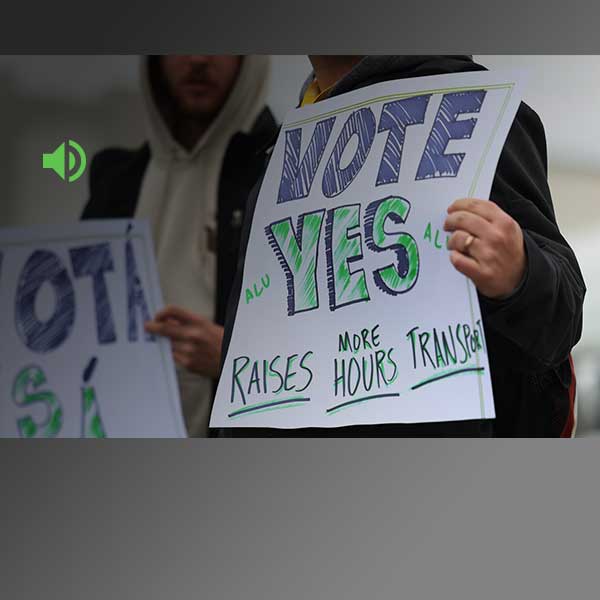Confidence in the U.S. Supreme Court is at a record low, but should the court care about its public image? Dahlia Lithwick -- senior legal correspondent at Slate, host of the podcast "Amicus" and author of the upcoming book Lady Justice: Women, the Law, and the Battle to Save America -- joins the podcast to discuss.
Below is a full transcript of the conversation, including time stamps. Full audio is posted above.
Mohamed Younis 00:07
For Gallup, I'm Mohamed Younis, and this is The ���۴�ýPodcast. In this episode, we take a closer look at the public's confidence and trust in the Supreme Court at a time when assessments of the court are in decline by most but not all Americans. Dahlia Lithwick writes about the law and the court system for Slate and is host of the "Amicus" podcast. Dahlia, it's great to have you on the show.
Dahlia Lithwick 00:30
Thank you for having me, Mohamed.
Mohamed Younis 00:33
Our data show that the court has reached sort of a historic low, in both its approval rating, job approval, but also confidence levels with some Americans, particularly in the past couple of years. I want to ask you, Dahlia -- and I think as a lawyer, it's kind of a trick question, but not -- should the Supreme Court care about its image with the public? Is that something that should actually matter to the justices as they consider these legal decisions?
Dahlia Lithwick 01:04
You know, it's not a trick question. It's in fact the question. It's a kind of existential question because the answer is of course the lawyerly "yes and no." No, they shouldn't care in so far as you know, by design, the court was created to be insulated from polls and public opinion, right? The court, when the framers thought about how they wanted to do this, they gave lifetime appointments, they created an institution that by design could be a check on the majoritarian branches, right? It's the only branch -- particularly after the court gave itself the power to review acts of Congress -- it's the only branch that can say, "We don't care what 90% of the public thinks. This is what's constitutional, and this isn't." And that's by design. So, the first half of the answer is no, the court shouldn't care. And maybe part of the evidence that they're doing something right is when they do something that's wildly unpopular. You know, think about desegregation, right? Think about Brown v. Board. So that's the first half of the answer.
Dahlia Lithwick 02:16
The second half of the answer is yes, they have to care. Why? Because they have no other power. And if you go back and you look at the Federalist papers. In Federalist 78, you have Hamilton saying the court is going to have neither the power of the purse nor the sword. The only power that the court has is judgment. And what that means is, in some sense, the only -- they don't have an army, right? They don't have a budget. The only power that the Supreme Court has is public legitimacy. And if the public says, you know what, we just don't want to abide by your rulings anymore. There's nothing the court can do about it. And so, the court is in this kind of uniquely fraught situation where they're both designed to not care what the public thinks and also the entirety of its power turns on the public acceding to what it thinks.
Dahlia Lithwick 03:18
And so, it's not a very black-and-white answer that I'm giving you. But I think that the answer is that they have to navigate -- and historically they've done better and worse at navigating this -- both following the lights of the Constitution wherever it may lead and not caring about public opinion, but also understanding that you can get in a situation -- and historically the court has many times been in a situation -- where the court issues a ruling and either the president says no or the American public says no. Because if the American public and Congress want to turn off the lights and stop up the toilets of the building, they can do that. The court has no power to enforce its will, and that pinging back and forth between those two poles of not caring about public opinion but being deeply mindful of public legitimacy, the court has to triangulate against those two values.
Mohamed Younis 04:19
That's an awesome breakdown. Let me ask you this, then: Are changing public perceptions of the court -- and you're right, they've gone up and down, but now they're kind of in a low, a historic low -- are they the result of the court behaving differently than it did before? Or is it more about the fact that the court has found itself in the national political conversation that has become, obviously, as we all know, polarized, negative, you know … just enter your negative adjective into that sentence.
Dahlia Lithwick 04:50
Yeah, I mean, here I'm going to answer with a yes and a yes. I think it's both. I think that, on the one hand, mistrust in the court as an institution really follows public mistrust in every institution, right? So, I mean, you know this better than anyone, but this is, in some sense, dovetails with mistrust of the executive, mistrust in the results of elections, mistrust in, you know, the military and police, mistrust in Congress. In some sense, when you're polling in the 30s and 40s, you should spike the football, right? That's a pretty high number, even though it's a historic low for the court, because the public, as you say, is, is profoundly polarized -- tends to believe that the other side is in bad faith, which is new. And as a consequence, some of this is simply of a piece with just general mistrust of institutions. That said, I think that what we have seen, which is this precipitous drop in the span of just a year in terms of trust of the court, also goes to how the court is conducting itself.
Dahlia Lithwick 05:59
And so I think that, you know, it really, we started to see the numbers around the Supreme Court this year tank when the court started doing things on the so-called shadow docket -- and that's this court's emergency docket, where they're not having arguments, there's very little briefing. Sometimes there's really, you get a midnight order from the court without reasoning. You don't even know sometimes who signs these. And famously SB 8, that was the Texas abortion ban that, that the court signed off on in September. They signed off on that without argument, without reasoning. Just in the middle of the night, 10% of the childbearing population in the United States had no access to abortion. That kind of thing, doing things on the shadow docket, offering no reasoning … Amy Coney Barrett's flying out to Kentucky to give a speech at the Mitch McConnell Center. So I think it's, it's both. I think it's both that the American public, as you suggested, is aware now that the court is at the epicenter of every hot-button cultural issue in a way that, you know, whatever you feel about guns, whatever you feel about environmental protection, whatever you feel about COVID regulations or abortion, the court's there. And that makes people very anxious, and that's some of the polarization.
Dahlia Lithwick 07:23
But I think the second piece of it is that in the face of that, the justices had the opportunity this year to pump the brakes. The justices had the opportunity to do what they usually do, which is go small -- pick two big issues, push the others off for next year. The court did none of that. They actually … my friend Leah Litman at University of Michigan is calling this the YOLO court: the #YOLO, "you only live once," court.
Mohamed Younis 07:49
That is so funny.
Dahlia Lithwick 07:51
Right? It's so brilliant, and I think it's true in the face of those tanking numbers that you describe. We had a court that looked around and said, "Let's do more." And that piece of it is the part that those of us who watched the court find really destabilizing -- that the court, as I suggested in my first answer, has always been tactically in conversation with public approval, with the American public. But this is a court that seems to have looked around and said, "Don't care. Let's do it again."
Mohamed Younis 08:24
That's such a great way to put it. And it's, you know, it is -- I hate to sound like an elitist here -- it's like people that went to law school, or if you're plagued, if you've been abused by a legal education, let me put it that way … there's definitely a lot of things that happened both with the Texas situation and the Dobbs decision that really fly in the face of how lawyers in America are taught to think of the court, right? Whether you're a flaming liberal or a, you know, hard-knuckle conservative. The court usually doesn't make these decisions that are so broadly sweeping, right? It's always about scope -- trying to bring the scope in to a specific issue and a specific case. Dobbs felt a little bit different in that it was really a huge kind of swipe or a really sort of broad swing with the bat, if you will. Whether you agree it's a fair pitch or not, that swing, that bat, really came across hard. Do you agree with that? Is that kind of what you're getting to?
Dahlia Lithwick 09:29
That's 100% what I'm getting to. And I would say this: The person to watch is the chief justice, right? John Roberts, who is a lawyer's lawyer, who approaches the law exactly the way you just describe, incrementally with what he would call judicial humility, the notion that we do only as much as we have to do to resolve this case in front of us and nothing more. And then we scrupulously, scrupulously ground it in the law. John Roberts is on the losing side, right? In some sense, certainly in the SB 8 case and a whole bunch of cases we've seen come down, and in fact John Roberts is the one who's starting to write. He concurred in Dobbs, in the idea that this 15-week Mississippi ban should be allowed to stand, but he was appalled at the idea that the court would use this as the vehicle to overturn Roe v. Wade. And his approach throughout his career has been exactly the kind of cautious, hyper-lawyerly approach you described. And also, I think it goes to my first point, he is so aware of what the public will and will not tolerate.
Dahlia Lithwick 10:45
And so, for him, for instance, toward the end of the term, he started saying, look, this is a huge issue, we can't decide it in an unsigned order on the shadow docket, right? Or look, we just two years ago ruled the exact opposite way. We cannot simply because the composition of the court has changed, willy nilly do away with precedent. And John Roberts stands alone, right? It's not his court. There are five people to the right of him and three to the left of him who actually are not interested in that kind of lawyerly approach. And I think it's exactly correct to identify that which has fallen away: It's that not just, you know, that Roe v. Wade is overturned or that we've massively expanded gun rights or that we've kneecapped the EPA and their efforts to regulate emissions. Those are sort of substantive data points. But that the approach, which is the one that John Roberts really epitomizes as both a lawyer and a chief, is approach that he alone now is interested in pursuing.
Mohamed Younis 11:53
Gosh, that's such a great way to put it. OK, it's easy though to feel like, oh my gosh, the sky is falling, and this is where kind of the long-term trends and data are helpful. We've kind of been here before. Right now, Republicans are very pleased with the court. Democrats are at a historic low -- 13% that approve of the job they're doing. But not too long ago, in 2015, when the court … I won't describe that case; I'll let you do it. But the court had a really important decision on same-sex marriage. We saw essentially the exact inverse. Democrats were sky high on the court. Republicans were in the dumps. Are these ups and downs just a part of the normal cycle of reaction to the court's decisions? Are we maybe making too much of this, you know, moment and "the sky is falling"? How critical is this moment, really, for the integrity of the court long-term, in your view?
Dahlia Lithwick 12:48
I think that's where the polling only tells part of the story, Mohamed. Because I think that it is absolutely descriptively correct that when Obergefell came down, as you said, that was the case that for the first time found the right to same-sex marriage in the Constitution. And you're quite right. That was a case where Democrats were delighted and Republicans were furious. It was, in fact, some may say, between that and the whole women's health, the abortion case that came down in 2016, was part of what pushed Donald Trump into the White House was that voters who were appalled at both of those outcomes really felt strongly that the composition of the court had to change. So, there is a way in which you can say, oh, this is just sour grapes. This is a pendulum. It goes back and forth. You know, today the conservatives are up and tomorrow they'll be down. But I think that what we are seeing in addition to the polling, and I can't believe we've been talking for 13 minutes and 48 seconds and haven't mentioned the leak, but this unprecedented leak of the Dobbs opinion. We have never in history had an entire draft opinion leaked to the public. While the case is still pending, we have had death threats against Justice Kavanaugh. We now have eight-foot security fencing around the building so that the public, which is protesting at the homes of justices, cannot threaten the lives of justices.
Dahlia Lithwick 14:25
And in addition to that extrinsic stuff, which is unbelievably consequential, we have the American public going crazy on the outside. And then we have the justices giving speeches in which they take swipes at one another. This is all brand new, right? So whether it's a couple of weeks ago, you know, Justice Alito traveling to Rome to give a speech at a private event where he essentially spiked the football for religious liberty -- instead of, just again, quietly letting the court settle down over the summer. We had Clarence Thomas giving a speech this spring essentially saying none of us trusts each other anymore. We have an investigation going on internally at the court of the leak that has required clerks to turn over their cellphones. So, I think that you're quite right that part of this is just the normal ebb and flow of public opinion, of winners and losers. But I think something profoundly different is also at work right now, and it's not just this wholesale sense that the court is a partisan institution that folks can't trust. But among the justices themselves, rhetoric that, that's coming out in their opinions, right?
Dahlia Lithwick 15:41
Justice Sotomayor talking about the stench of illegitimacy in the Dobbs case. The dissenters in the Dobbs case -- Justices Breyer, Kagan and Sotomayor writing a joint dissent, essentially saying, "You don't care about public legitimacy because if you did, you would not do this." Those kinds of really, I think, visceral, personal gut punches that you're seeing justices delivering to one another? That stuff is brand new. That is the stuff we have not seen certainly, you know, since the FDR court-packing, roiling public conversation around the court. So, I think it is both that public confidence has really plummeted, but in a weird sense that the justices have thrown gasoline on that fire and again, given the option to pump the brakes and to say, "All we have, you know, to go back to the Federalist papers, is public confidence in us. We can't even evince confidence in one another." That's new.
Mohamed Younis 16:45
I can just literally see all of my law professors cringing as you mentioned these facts. It's like, ooh, like all of the things that really in a traditional legal sense, in a traditional legal education paradigm sense, are not supposed to be happening. I want to end with what to me was the most shocking -- not necessarily shocking, but concerning --statistic in this year's poll on the court, which is that most women in America, 61%, now disapprove of the job the court is doing. I know you have a really important upcoming book on exactly this topic. It's called Lady Justice: Women, the Law, and the Battle to Save America. Reflect on that statistic, and tell us about the book.
Dahlia Lithwick 17:29
Well, thank you for saying it's an important upcoming book. I think it's important. It's coming out in September, and it's published by Penguin Press. And it is about what I think is this incredibly essential, complicated relationship between women and the law. And in some sense, you know, most of it frankly was written before Dobbs. But I think, as you note, the response to Dobbs has been profoundly gendered. And as a consequence, the polling, I think, really reflects that, and we have to stop and think about the fact that as Justice Breyer, Justice Stephen Breyer, who retired, retired this year departs the court and is replaced by Justice Ketanji Brown Jackson, we are now in a very unseemly position, where the three dissenters for the foreseeable future -- possibly for decades, unless something changes -- are going to be women. And what does it mean to have women persistently in dissent on issues that, you know, are going to include a lot of questions about bodily autonomy, about contraception, right? About whether you can travel interstate to terminate a pregnancy. All that is going to come to the court. And just sit with that -- the optics of what it's going to look like to have three women dissenting with Amy Coney Barrett and the men in the majority.
Dahlia Lithwick 18:58
So, I think that there is again, just going back to this legitimacy question that has been threaded through this whole conversation, the optics of having the women saying, as they did in the Dobbs dissent, how is it possible that women are invisible to the majority? How is it possible that Justice Alito writes an opinion in which he says, yeah, I don't know if women had a reliance interest in Roe, you know. There's no way to figure it out, shrug. I don't know if this is going to affect women's health or their economic access to equality, shrug. The fact that he didn't even engage with just copious amounts of briefing about how Dobbs would affect women, not just, you know, what we're seeing now, you know, women who are having to bleed out in Texas before they can get an emergency termination of an ectopic pregnancy, but simply the fact that he was willing to go back and cite, I mean, quite literally, people who, you know from, from, from hundreds of years ago who were OK with witch burning, but that women were not visible in the majority opinion.
Dahlia Lithwick 20:13
And I'm trying to not sound political or partisan. I'm just saying that it is very, very difficult for anyone who can imagine that it is them or their kid who has an ectopic pregnancy, who has, you know, as a result of rape or incest or who, you know, birth control has failed. Who can't imagine themselves into the world of Dobbs? And yet somehow Justice Alito could not imagine himself into that reality. And so, I think those numbers that you are citing are very, very much a product of that first thing we talked about, which is that it would not have been hard to write this opinion with at least the semblance of regard and solicitude for the lived experience of pregnant people and how this would affect them. Justice Alito chose not to do that. Chose to write, in some sense, the most dismissive iteration of this opinion that he could in terms of how this will affect people on the ground. And I think that's some of what you're seeing in that polling. And if you think about what we first started with, the Federalist paper of the court, the Federalist papers, the court having neither the power of the person or the sword, only the power of public legitimacy. How horrible, horrible is it for the dignity, the integrity, the legitimacy of the court that women in America say the court is not a court. I think it's chilling. And I think the people who should be most chilled by that are the people who seem least apt to care right now.
Mohamed Younis 21:57
On that very serious note, that's Dahlia Lithwick, host of the "Amicus" podcast. Dahlia, it was so great to have you on the show.
Dahlia Lithwick 22:04
Thank you so, so very much.
Mohamed Younis 22:13
That's our show. Thank you for tuning in. To subscribe and stay up to date with our latest conversations, just search for "The ���۴�ýPodcast" wherever you podcast. And for more key findings from ���۴�ýNews, go to news.gallup.com or follow us on Twitter @gallupnews. If you have suggestions for the show, email podcast@gallup.com. The ���۴�ýPodcast is directed by Curtis Grubb and produced by Justin McCarthy. I'm Mohamed Younis, and this is Gallup: reporting on the will of the people since the 1930s.



